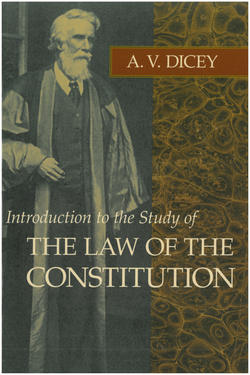Читать книгу Introduction to the Study of the Law of the Constitution - A. V. Dicey - Страница 8
На сайте Литреса книга снята с продажи.
Оглавление[print edition page xxiv]
[print edition page xxv]
PREFACE TO THE FIRST EDITION
This book is (as its title imports) an introduction to the study of the law of the constitution; it does not pretend to be even a summary, much less a complete account of constitutional law. It deals only with two or three guiding principles which pervade the modern constitution of England. My object in publishing the work is to provide students with a manual which may impress these leading principles on their minds, and thus may enable them to study with benefit in Blackstone’s Commentaries and other treatises of the like nature those legal topics which, taken together, make up the constitutional law of England. In furtherance of this design I have not only emphasised the doctrines (such, for example, as the sovereignty of Parliament) which are the foundation of the existing constitution, but have also constantly illustrated English constitutionalism by comparisons between it and the constitutionalism on the one hand of the United States, and on the other of the French Republic. Whether I have in any measure attained my object must be left to the judgment of my readers. It may perhaps be allowable to remind them that a book consisting of actually delivered lectures must, even though revised for publication, exhibit the characteristics inseparable from oral exposition, and that a treatise on the principles of the law of the constitution differs in its scope and purpose, as well from a constitutional history of England as from works like Bagehot’s incomparable
[print edition page xxvi]
English Constitution, which analyse the practical working of our complicated system of modern Parliamentary government.
If, however, I insist on the fact that my book has a special aim of its own, nothing is further from my intention than to underrate the debt which I owe to the labours of the lawyers and historians who have composed works on the English constitution. Not a page of my lectures could have been written without constant reference to writers such as Blackstone, Hallam, Hearn, Gardiner, or Freeman, whose books are in the hands of every student. To three of these authors in particular I am so deeply indebted that it is a duty no less than a pleasure to make special acknowledgment of the extent of my obligations. Professor Hearn’s Government of England has taught me more than any other single work of the way in which the labours of lawyers established in early times the elementary principles which form the basis of the constitution. Mr. Gardiner’s History of England has suggested to me the conclusion on which, confirmed as I found it to be by all the information I could collect about French administrative law, stress is frequently laid in the course of the following pages, that the views of the prerogative maintained by Crown lawyers under the Tudors and the Stuarts bear a marked resemblance to the legal and administrative ideas which at the present day under the Third Republic still support the droit administratif of France. To my friend and colleague Mr. Freeman I owe a debt of a somewhat different nature. His Growth of the English Constitution has been to me a model (far easier to admire than to imitate) of the mode in which dry and even abstruse topics may be made the subject of effective and popular exposition. The clear statement which that work contains of the difference between our so-called “written law” and “our conventional constitution,” originally led me to seek for an answer to the inquiry, what may be the true source whence constitutional understandings, which are not laws, derive their binding power, whilst the equally vigorous statements contained in the same book of the aspect in which the growth of the constitution presents itself to an historian forced upon my attention the essential difference between the historical and the legal way of regarding our institutions, and compelled me to consider whether the habit of looking too exclusively at the steps
[print edition page xxvii]
by which the constitution has been developed does not prevent students from paying sufficient attention to the law of the constitution as it now actually exists. The possible weakness at any rate of the historical method as applied to the growth of institutions, is that it may induce men to think so much of the way in which an institution has come to be what it is, that they cease to consider with sufficient care what it is that an institution has become.
A. V. DICEY
All Souls College, Oxford, 1885
